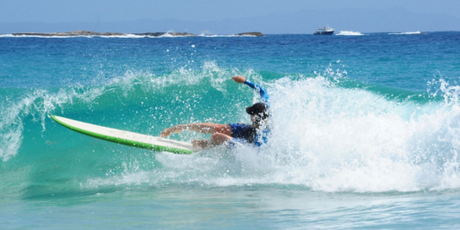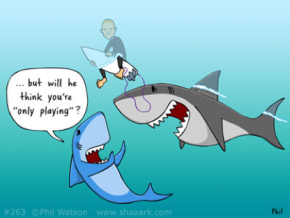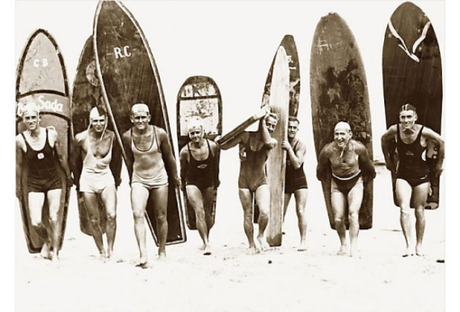
Our very own surfing scientist, Dr Katharina Peters
(originally published on the GE.blog)
The last time I went surfing the waves were very slow and between sets I had a lot of time to contemplate life. This was when it occurred to me that the pursuit of a career in academic research was similar, in many ways, to trying to catch waves. Here are 11 surprising things surfing and academic research have in common:
1. It’s a constant struggle and a long, hard slog to get past the white water
Paddling out through the white water, having wave after wave come crushing down on you while trying to turtle-roll through the biggest ones, can be a real challenge. Likewise, in science it takes most people years of study, work (often unpaid), long hours in the lab, the field, and at the desk, to establish themselves and potentially secure employment for a period longer than a year or two. You find yourself working late finishing papers from research you did years ago (again, usually unpaid), or volunteering to get more hands-on experience because you know how important these things are. But you power on, always trusting that, just like paddling through the white water will help get you the stamina and shoulder muscles you need to catch waves, all this work will lay the foundation for your career and make you a better scientist.

2. Women are underrepresented and often treated badly (but it’s changing!)
Whether you look around you in the line-up at your surf spot or at a scientific conference, women are underrepresented. Many women I know have experienced discrimination related to their gender, as women are often not assessed based purely on their ability to shred or do high-quality research. Indeed, reviewers have an unconscious bias against women in science, and in surf competitions men get to compete when conditions are optimal whilst women are relegated to whatever is left. Nevertheless, slowly but surely, things are changing for women. It will still take many years to reach an equilibrium (if there is such a thing), but people are becoming more and more aware of the gap, and female researchers and surfers are pushing that glass ceiling.
3. Others always seem to be performing better than you
This is probably true for many areas in life! It always looks so much easier when others do it, and we tend to only see those who do better than us (also, imposter syndrome, anyone??). I guess it’s a lifelong task to learn not to compare yourself to others, to stay focused on your path and try to take inspiration from the achievements of others, rather than letting them demotivate you.

As much as most of us would like to be able to control everything that happens in our life, when you are a surfer or on the academic research path, you must learn to deal with a lot of uncertainty. Swells and jobs come and go as they please; you might be able to get some, but there will be many that you narrowly miss out on. There are dangers like the ever-present fear of a shark attack or sudden unemployment. As with most things in life you will learn to surrender and try not to worry too much about it.
5. People in your family think you’re crazy for investing so much time into it and don’t understand why you do it
Everyone who surfs or does academic research has probably been asked why the hell anyone would put themselves through that ordeal. Questions like “When will you get a real job that actually pays?” or “Why do you do that funny sport where you sit around and wait most of the time?” and “How do you deal with the cold/insecurity/pressure/stress/fear of sharks?” are very common in our field. Only other surfers/researchers can truly understand your passion.
6. Pushing the boundaries of your comfort zone is worth it but you might wipe out several times
Whether it’s giving a talk at a conference, submitting a paper to a high-impact journal, or going for a wave that is just that little bit bigger than what you’re comfortable with: challenging yourself and going out of your comfort zone will bring you further in the long run, even though you might wipe out many times in the process.
7. There are a lot of egos around you
It is tough to become a successful academic researcher or a good surfer, so it is maybe not surprising that many people who have established themselves in these fields have quite an ego, which can be hard to work with at times. In surfing as in science, respect the locals/PIs but stand your ground and know your worth.

8. Yoga, meditation, and healthy eating will increase your performance
Dealing with papers, grant applications, students, and supervisors can be mentally challenging. In both surfing and research, dealing with rejections (by waves or reviewers) can chip away at your confidence. Sitting on your desk for long hours is taxing on your body. And even though surfing is a relatively balanced physical activity, hours spent in the water will put strain on your back and shoulders. Practicing yoga and meditation can help alleviate some of the stress you put your mind and body through, provide you with much needed physical and mental strength, and better your ability to concentrate. Eating healthy foods will nourish your muscles and your brain, and fuel your research as well as your surfing.
9. It’s more fun together
Just as surfing, for me research is a group activity and it’s more fun when done with like-minded people. Joining forces with others that are more experienced or can teach you skills that you are lacking will make you a better researcher/surfer.

© Philip Gendreau
10. You get to see beautiful places and lots of sunrises
Surfing is usually best in the morning, and biological fieldwork often starts very early (except for those poor souls studying nocturnal creatures). Early mornings looking for dolphins (applies to surfers and marine biologists), catching birds or chasing waves: research and surfing can take you to beautiful places if you’re willing to get up early. For those non-biologists, there is always the conference as an excuse for some travel 🙂.
And last but not least:
11. In surfing and academic research, when it all comes together it can be wonderful and very satisfying, all the work was worth it, and you feel like you can take on the world.
Until the next wave/rejection slaps you off your board and teaches you once more to be humble. 🏄🏼♀️

